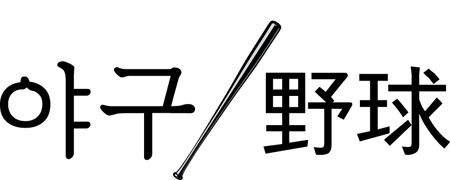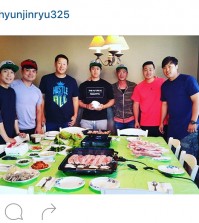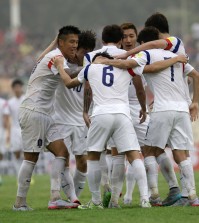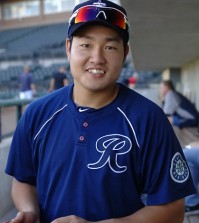- California Assembly OKs highest minimum wage in nation
- S. Korea unveils first graphic cigarette warnings
- US joins with South Korea, Japan in bid to deter North Korea
- LPGA golfer Chun In-gee finally back in action
- S. Korea won’t be top seed in final World Cup qualification round
- US men’s soccer misses 2nd straight Olympics
- US back on track in qualifying with 4-0 win over Guatemala
- High-intensity workout injuries spawn cottage industry
- CDC expands range of Zika mosquitoes into parts of Northeast
- Who knew? ‘The Walking Dead’ is helping families connect
Why Koreans call baseball ‘yagu’
By Patrick Bourgo / SABR Korea
With the Korean Series underway between the Nexen Heroes and Samsung Lions, one is likely to hear the word “yagu” wherever one goes, from offices to watering holes.
“Yagu,” meaning baseball, is a familiar term for anyone with a passing interest in the sport in Korea. However, few know where and when the term originated.
The answer to that question is a fascinating one, illuminating the history of the sport here and echoing the nation’s own turbulent past.
Baseball has been played in Korea since the late 19th century, toward the end of the Joseon Dynasty. The earliest reported use of the word baseball in a newspaper in Korea, in English, occurred in the mid-1890s, but at the time, the old fashioned spelling ㅡ “base ball” ㅡ was used.
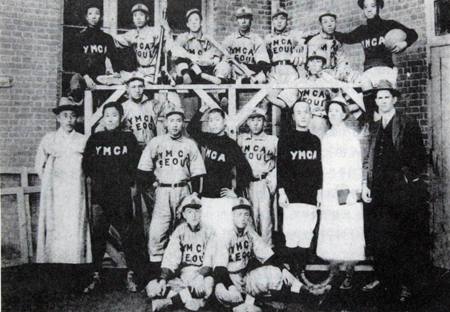
The baseball team of Hwangsung Young Men’s Christian Association (presently the Seoul YMCA), including its manager Philip Gillett, far right, an American missionary, poses for a photograph in 1911. It was around this time that Koreans began calling baseball by the name “yagu.” (Yonhap)
When looking at the history of a particular word, it is important to remember that many Korean words have Chinese characters (called “hanja” in Korean), and can be written in either hanja or hangeul. It also should be noted that until recently, it was common for hanja to be used in published writing, such as newspapers, instead of hangul.
The word “yagu” is comprised of two Chinese characters. The first syllable means “field” and second means “ball.” So yagu can literally be translated “field ball.” However, this breakdown doesn’t explain where and when the term originated.
To answer these questions, a good place to start is with Phillip Gillett, a man who has been credited with introducing baseball to Korea (although it would probably be more accurate to credit him with popularizing a sport that was being played before his arrival on the peninsula).
As in other countries in the early days of baseball’s introduction, such as Japan, a number of different names were used in Korea before “yagu” became the standard.
When baseball started taking hold among Koreans in the early 1900s, it was primarily being played by young people. In its nascent days, it was played by students at schools and academic institutions such as the now-famous Hwangsung Young Men’s Christian Association, language institutes, Kyungshin School and Whimoon School. It is in connection with these schools that we find some of the earliest references to baseball in the Korean language.
According to some, Gillett, the head of the YMCA at the time, used the term “tagu” for baseball, and one of the earliest references to the game came in 1906, when a Korean newspaper referred to the sport as “tagu.” The literal translation of tagu could be “hit ball.”
Another term, “tugu” was also used in the early days. A possible translation of tugu is “throw ball.”
However, to better understand the origins of the word “yagu,” we should look at the origin of the term in Japan.
Numerous sources state that baseball arrived in Japan in the early 1870s. The game of baseball is called “yakyu” in Japan and uses the same Chinese characters as “yagu.”
Tadaoka Koki is credited by some as the first person to use these characters to refer to the game of baseball in Japan, although he pronounced it “nobooru.” Chuma Kanoe , inducted into the Japanese Hall of Fame in 1970, is widely credited with coining the word “yakyu” in 1894. He used the same Chinese characters as Tadaoka, but pronounced them “yakyu,” which continues to be the word used for baseball in Japan to this day.
Even before the annexation of Korea by Japan in 1910, many young Koreans went to study in Japan, where baseball was also being played, and would come back to Korea and play the game. One of these groups of Korean students from Japan visited Korea in 1909 and played baseball with Koreans, and even had their own baseball song, a kind of team anthem.
They traveled around Korea playing and teaching people how to play baseball and shared their song as well. Newspapers reported about the students and their love of the game. One paper wrote about the group under the headline, “Baseball team’s song.”
It was in one of these newspaper articles that we can find one of the earliest uses of the Chinese characters for yagu. In as early as 1910, it is possible to find references to yagu in Hangul.
It was after these exchanges with Korean students playing baseball and studying in Japan that the Chinese characters for the word “yagu” would be seen in print in Korea. After this point, other terms for the game, such “tugu” and “tagu” appear to have gone out of use.








